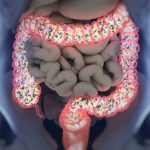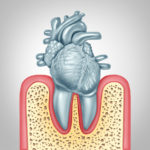By Bonnie Jenkins, Advanced Natural Wellness
Tis’ the season for overindulging at big holiday meals, and on high-calorie treats and alcoholic drinks. It’s also the season for post-meal bloat, indigestion and the occasional bout with food poisoning.
Of course, practicing moderation can help you sidestep most gastrointestinal problems during the holidays. But, since that can be a hard prescription to follow, arming yourself with some natural ways to ease tummy troubles can get you back to the festivities fast.
Too Much Of a Good Thing
Unless you’re paying close attention to how much you’re eating at a holiday dinner (not something many of us do), it’s easy to overeat. And it has nothing to do with willpower. The unfortunate fact is that it takes about 20 minutes for the stomach to signal the brain that it’s full.
The best way to help coordinate the brain and stomach is to simply eat slowly. Instead of shoveling the food in, take a break and join in the conversation. When you do take a bite, chew – and chew and chew. Chewing your food well helps to break it into smaller pieces that are more easily digested.
If you do wind up feeling gassy and bloated after the meal is over, grab a candy cane! Better yet, enjoy a cup of peppermint tea. Peppermint contains menthol, which helps relieve intestinal cramps by relaxing the smooth muscles in the intestinal tract. It also improves digestion by stimulating the flow of digestive secretions and bile. Clinical studies verify peppermint’s traditional use as a digestive aid. In a trial involving 120 people suffering from chronic dyspepsia, more than 43 percent experienced marked relief after taking a peppermint supplement (combined with other digestive herbs).
Plagued by gas? Try some fennel. This tasty herb contains terpenoids that inhibit spasms in the intestinal tract. But fennel’s most appreciated property is its ability to relieve gas and bloating. If gas strikes, take 960 mg. of a standardized fennel supplement. If you don’t experience relief within an hour or so, take another dose.
MD Exposes the Hidden Danger to Your Eyes

When your eyesight starts to fail, it's a real problem. Suddenly you can't go to the grocery store... you can't get to the doctor if you have an emergency... you can't meet your friends for dinner…
Your "regular" doctor doesn't have time to keep up with the latest research. And the same goes for eye doctors. They go to school to learn how to fit you for glasses and contacts, but have no way of preventing the damage and loss of eyesight that threatens your freedom and independence.
Let me show you something that explains a LOT about how your eyes work.
In my FREE Special Report, I'll show you a HUGE, untapped resource for your eyes that safely and naturally restores clear, effortless eyesight.
Click here to get started...
Quell Queasiness
Feeling full is bad enough. But when that fullness turns into nausea, it’s time to take action. Numerous studies show that ginger helps to safely ease nausea in people suffering from morning sickness and motion sickness. It can do the same for post-meal nausea.
Ginger is considered a tonic for the digestive tract, stimulating digestion and toning the intestinal muscles. This action eases the transport of substances through the digestive tract, lessening irritation to the intestinal walls. Ginger may also protect the stomach from the damaging effect of alcohol.
If you want to prevent or treat nausea, take 500 mg. of dried ginger powder or sip a cup of ginger tea. If you find yourself in a restaurant or bar, you can order up some ginger ale in a pinch. While not as effective as a supplement or a cup of ginger tea, it will help relieve a minor bout of queasiness.
Get “Pro” Active
The best way to fortify your intestinal fortitude day in and day out is with probiotics. These friendly intestinal bacteria live in the intestines and play an important digestive role by keeping bacteria balanced and in check. But, inadequate probiotic levels are common, which causes inefficient nutrient processing and slowed digestion. Chronically low probiotic levels can also lead to compromised immunity and candida overgrowth, the cause of yeast infections.
To increase your beneficial bacteria levels, include fresh, active-culture yogurt in your holiday menu. Note, however, that if yogurt is more than a day or two old, the good bacteria become ineffective before reaching the intestines. For this reason, taking a daily dose of a multi-strain acidophilus-bifidobacterium supplement can help populate your gut with a steady stream of friendly bacteria. Look for a supplement containing at least 1 million live organisms per dose.
One Last Thing …
The World's Quickest Solution for Ending Prostate and Urinary Misery
This has recently been revealed to be one of the only real breakthroughs in prostate health.
The seeds of a strange fruit (sometimes called "Chinese Apples") hold powerful phytonutrients that are a revolution in prostate health.
In fact, UCLA and Veterans Administration research have now proved this to be true.
Not only that, but it may be the worlds quickest solution for ending prostate misery.
Simply stated, these phytonutrients represent a huge step beyond beta sitosterol, saw palmetto, and other phytosterols alone.
Simply click HERE if you want to have fast prostate relief...restful, uninterrupted sleep...no more constant "urges to go"...enhanced virility...and optimal prostate support for life.
If you’re at a party where someone else is tending bar, you might not notice that the drinks are stronger than you’re used to. Or you might lose count of how many you’ve had. The next time you’re at a holiday event, try one of these tricks to help pace yourself and prevent dehydration: dilute your drinks, or alternate one alcoholic beverage with two nonalcoholic drinks. Or, try taking vitamin B6, which can also dial down the unpleasant side effects of alcohol: Take 400 mg. before the party, 400 mg. during the party, and 400 mg. before bed.
If you do overindulge on alcohol, drink plenty of water, juice or sports drinks to help your body rehydrate. When you imbibe, urination revs into high gear, because alcohol interferes with the release of vasopressin (a hormone that lessens the amount of urine made by the kidneys).
You can also protect your liver with some milk thistle. Taking 400 to 500 mg. of silymarin, the active constituent in milk thistle, supports your overworked liver by removing toxins and even regenerating injured liver cells.
This Just In …
The holidays are notorious for throwing even the most well-intentioned weight-loss efforts off course. At this festive time of the year, overeating is the norm, and exercise falls by the wayside. It’s no wonder that, for many of us, post-holiday weight gain often follows. But this weight gain isn’t just caused by how much you eat during the holidays. New research suggests that erratic eating, another holiday season hazard, also contributes to those extra pounds. English researchers have found that irregular eating significantly reduces the number of calories the body burns after eating.
But a little prior planning can help you outsmart wacky meal schedules during the holidays. Here are a few tips:
• Stick with a regular meal schedule on most days.
• Fill most of your plate with lower-calorie, fiber-rich choices like fresh salad, vegetables and fruit.
• Enjoy holiday favorites in small portions. Moderation, not deprivation, is key.
• Drink nonalcoholic, low-calorie beverages, like seltzer mixed with fruit juice.
• Plan an activity to help burn those extra calories and combat holiday stress.
If you’re the one doing most of the baking and cooking, beware! Keeping all of those goodies within reach can really do your diet in. Instead of keeping all that food on hand, try this: put a few cookies or candies on a plate to enjoy. Then either freeze or give away the rest. Hosting a dinner? Send the leftovers home with your guests!
If willpower isn’t your strong suit, it may be time to bring in the big guns. Chromium picolinate is a mineral that helps regulate blood-sugar levels. But a new study of overweight women who craved carbs (think holiday cookies) shows that taking 1,000 mg. of chromium picolinate for eight weeks reduced the amount of food participants ate. Better yet, this mineral put a damper on hunger pangs and fat cravings, and as a result, decreased body weight.
So don’t wait until after the new year to tackle holiday weight gain. Be proactive with some easy-to-live-with lifestyle changes and a daily dose of chromium picolinate for the jolliest holiday season ever – without any regrets!
References:
Anton SD, Morrison CD, Cefalu WT, et al. “Effects of chromium picolinate on food intake and satiety.” Diabetes Technology and Therapeutics. 2008;10:405-412.
Farshchi HR, Taylor MA, Macdonald IA, et al. “Decreased thermic effect of food after an irregular compared with a regular meal pattern in healthy lean women.”
International Journal of Obesity and Related Metabolic Disorders. 2004;28:653-660. Madisch A, Holtmann G, Mayr G, et al. “Treatment of functional dyspepsia with a herbal preparation. A double-blind, randomized, placebo-controlled, multicenter trial.” Digestion. 2004;69:45-52.
Yamahara J, Huang QR, Li YH, et al. “Gastrointestinal motility enhancing effect of ginger and its active constituents.” Chemical and Pharmaceutical Bulletin. 1990; 38:430–





